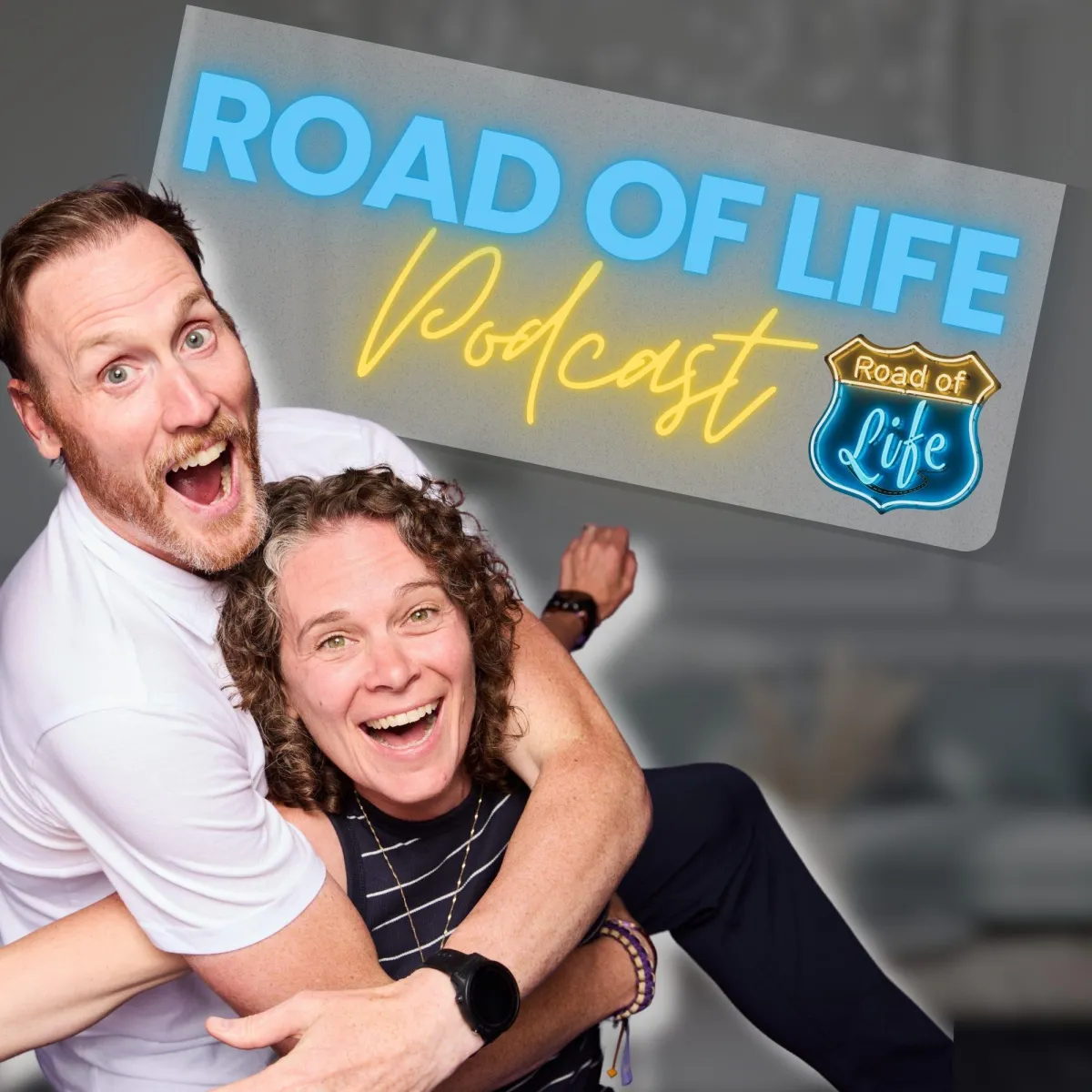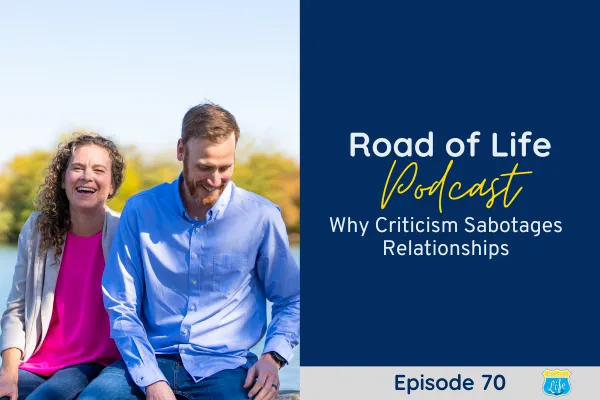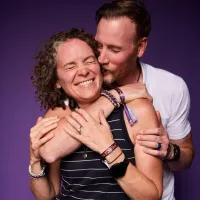
The
Road of Life
Podcast
With Meredith MacKay & Craig Bennett
Listen

70. Criticism: The First Horseman of Relationship Apocalypse
Listen Now
Episode Transcription
Welcome back to another episode of the Road to Life podcast with Meredith and Craig.
This week we're starting a four part series on the Four Horsemen of the Apocalypse. So the four horsemen of the apocalypse are a concept from John and Julie Gottman, who are basically like the big researchers in relationships and marriage. Yeah. Like the king and queen of relationship research, basically.
And they've identified through crazy amounts of research, these four behaviors that when they exist in your relationship are actually a sign that the relationship is doomed for lack of a better term. It's going down the wrong path. You definitely, when you have the one of these four or all four or some sort of indication that these things exist in your relationship, you want to turn that around quick because if that persists in your relationship, it is more likely to end in divorce or separation or breaking up or whatever the word you want to use is.
Yeah. And so there's four. . The first one is criticism. Mm-hmm . Second one is contempt. Mm-hmm . The third one is defensiveness. Mm-hmm . And the fourth one is stonewalling. And we're gonna talk about over the next four episodes, each one. Mm-hmm . But this episode in particular, we're going to kind of deep dive into criticism.
Yeah. Criticism. Is it sneaky one? Hmm. I think of all of them. It might be the sneakiest one. Well, I think, 'cause sometimes it can start out as. Kind of like joking almost like at the other person's expense and then it can snowball from there into more. Yeah, and so I guess let's be clear on what exactly I think we all sort of Inherently have an idea of what criticism is or what criticism feels like but criticism like specifically based on the research Is when you attack the other person's character Instead of talking about a behavior
instead of saying something like, I didn't feel heard yesterday when I was having that conversation with you. Instead of saying something like that, you say, you never listen. You're always doing something whenever I'm trying to tell you something important and you always dismiss me. And you don't care what I have to say.
So you can see how the first one is talking about a specific behavior. Behaviorally. I didn't feel heard. You weren't listening to me when we were talking. Can we talk about that? Versus attacking the character, which is, You don't care. You never listen to me. You obviously don't care what I have to say.
Like, those are two really different things. And, you know, another one that comes up more often, or just as often probably, is You never load the dishwasher. You never do the dishes. You're so lazy. You're so useless. Instead of, you know, yesterday when I felt overwhelmed, I asked you if you could just take on that one task of the dishwasher while I was doing these things and it's still not done.
And it just makes me feel so unappreciated and unheard and disrespected versus you're useless and lazy and never do anything. Right. So there's a big difference between Speaking constructively about a specific behavior that needs to be talked about and addressed versus attacking your person, the other person's character.
So that's, the big difference between criticism and just a productive conversation with constructive feedback. And so we're trying to aim for constructive feedback so that we can, Disagreement. We always want to grow through disagreement. Every opportunity, every engagement that you have with each other is an opportunity to either connect or disconnect.
And when we criticize, we're disconnecting and, disconnecting at a huge rate and, getting very, very far apart. But when we come together through disagreement and we can have the conversation of. Just dealing with the very specific issue and how it made you feel and then coming to some sort of resolution on that Then we can grow through that disagreement.
Yeah, that's always the aim. And so how is it that we end up criticizing because I think The vast majority of us don't actually want to make the other person feel bad in a vacuum like we that's not something we usually set out to do at the beginning of our day or We don't want to make our relationship actively worse.
It's not something that we strive for as a goal when we get up in the morning. But somehow it sneaks in. I think a lot of it is, what we're raised in the environment we grow up in. We can see it modeled for us. Our friends maybe do it and we just pick up on that. Especially like, you know, as teenagers, I remember growing up as a teenager, criticism was like, it was funny.
Like it was something that you just did with your friends and that bleeds over into other relationships and it's not even good with your friends. It's terrible, but it was the norm yeah. Growing up. . So I think when, something becomes the norm, it just becomes natural and you just start to deploy it in all your relationships.
Yeah. It doesn't even feel like something to be avoided. It's just, a normal way to address that's how we communicate. . Yeah. The first one is, was that role model to you as a child? Yeah. Because , I guess all of our communication styles that we do without, intention, without full levels of awareness and mindfulness.
We learned that growing up from, our parents, from our aunts and uncles, from our cousins, from our friends, from our teachers, , we know nothing growing up. Like we learn everything. So if, criticism is a tactic that you use or we use, I think the important thing to remember is it's not your fault.
You were, , Exposed to it. And so one thing it's, not your fault, but now that maybe you're becoming aware of it, it's your responsibility to change it, especially if it's impacting your relationships. I think also criticism comes out. In moments of frustration and overwhelm when the emotions are really high.
If you feel unheard, it's probably a defense mechanism. Yeah. And I've said it before, Sharon Lecter, very, very famous and successful author. She always says high emotion, low intelligence. So when your frustration is high or your overwhelm is high, or you've got all this coming up inside of you because you're feeling unheard, unappreciated, unseen on all those things, sometimes it just.
Literally comes out of you in a fit of emotion. Yeah. And so I think it has nowhere to go. Yeah. And you've been bottling it up for so long. If you just want to get it out of you. Yeah. And it just comes out. Yeah. So that one's a tough one because that one's going to take the most awareness in the moment when you feel that rising, that frustration and that overwhelm rising inside of you before it comes out of your mouth directed at the other person.
It takes a minute. To take a beat. Yeah. I think one of the ways to really combat that is to get really good at communicating and speaking your truth and addressing things as they come up and not holding them in and letting them bottle up. , it's simple but it's not easy. Like we always talk about, there's a lot of things that are simple but not easy.
But as you start to develop the communication muscle, you can start to have those conversations with your audience. Your person and they become easier and easier so that you're kind of releasing the valve every now and then so it doesn't just blow like a shaken up soda can exactly. Yeah, yeah, for sure.
Yeah. I think another reason criticism slips out is because it's hard to ask for help. Yeah, it takes courage. No matter what relationship it is to raise your hand and say, I'm overwhelmed or I can't, I'm at my limit. I, I need help with this. I think a lot of times we've grown up or we've been socialized to believe that we need to do it all and we need to do it all, all by ourselves because we get like an extra merit badge when we achieve our success all by ourself.
So to your point, releasing that valve a little bit, usually looks like asking for help on the front end instead of waiting to be completely frustrated and disappointed on the back end when it explodes. So it takes a little bit of courage and vulnerability. to ask for help on the front end.
So you don't get to that point. And understanding your limits and when you need to recharge and when you need to have those conversations that you're taking on too much and that you need to scale back. You have to understand your body and what you can take and you know, it's, really gauging that and getting good at offloading some of the tasks that are being done.
building up or some of the stress that's going on in your life and being able to, have those conversations and take care of yourself so that you don't blow. And then when you do blow, it turns into criticism and all that stuff. So that's, what we need to like pay attention to. Right.
The other thing I think that feeds into it, the other, variable that feeds into when the criticism kind of just slips out is it's a lot easier to point fingers and blame than it is to accept responsibility for things. A lot of times I think when we're criticizing, sometimes we're actually mad at ourselves about having not.
fulfilled on something or done something differently and we take that out on someone else. We're actually a lot of times speaking to ourselves, but projecting it on someone else. Yeah, for sure. So we're criticizing ourselves and it's usually a word like a worthiness thing or something to do with us that we're projecting outwards
the world's a mirror, basically. So anytime you're seeing something that's frustrating you and someone else, there's a good chance that there's something that you see in them that you also see in yourself. Right. And so it certainly feels easier on the inside to direct that at somebody else and cast the blame than it is to accept the responsibility for what you could have done to have changed that situation.
Yeah. And obviously our motto, our credo, whatever it is, is like a 200 percent marriage and it's taking 100 percent accountability and responsibility for everything in your marriage. And when you do that, the criticism actually stops you're both of you. Yeah. because both people are taking a hundred percent responsibility.
It's like, Oh, that's on me. I got to do better. I got to do that. I got to, fix that. I got to do something different here. And when you do that, then you're not outwardly projecting criticism on someone else. , because that is super damaging. Right. Because when you're criticizing, the other person is feeling attacked and defensive.
Resentment. Which we'll get to defensive in another couple episodes. But the feeling attacked leads to defensiveness. leads to resentment and that is creating distance between you. And when you feel attacked, then you go on the offense. So then when they feel criticized, they're going to lash out at you and they're going to criticize something that you've done or they're going to start using the, you never remember that time when you did and scorekeeping comes in.
Yeah. And then you're stacking on top of each other and now you're super disconnected. Yeah. The other really damaging outcome of criticism, I think is That you're reinforcing for the other person that they're not good enough. Like, we all already have enough trouble trying to build our own self worth and feel like we're good enough all day, every day.
That when someone we're in a relationship with, someone that we're close to starts feeding the narrative, adding fuel to the fire that I'm not good enough because of criticism, it's just further eroding self worth. And when you don't feel good enough You're going to end up sabotaging the relationship so criticism one of the downstream impacts of that Is the negative self worth feeling for the other person and then the further self sabotage of the relationship.
So we've talked about what criticism is and how it's so destructive, but let's say someone sees in themselves, they resort to criticism. It's in their relationship. They're disconnected as a result. How can we combat it? What's the antidote? What do we do? Yeah. Well, to your point, start letting some of that pressure take care of you.
Yeah. Take, take the pressure off the valve. Yeah. . So first of all, Understand when you're feeling overwhelmed so that you don't get to the point of blowing, right? So let's recharge. Let's take some stuff off the plate. Let's focus on the things that recharge you and we'll Release that pressure right and then having those conversations if you're trying to take some things off the plate and free up some time and space For those for that recharge , it's the same rules that we've talked about before for starting a productive disagreement or having a difficult conversation.
It's speaking specifically, not generally. So words like always and never, just delete them from your vocabulary because they never work. So just delete them completely and speak specifically to a behavior. A specific example of a specific behavior and how it has impacted you specifically. Yeah. I think another really cool tactic is, let's focus on the positive. Instead of criticizing for the negative, what are all the good things that are happening? Instead of, you never do this, what do they do all the time for you? Like, focus on the positive and start . Addressing that or, bringing that to the forefront and, appreciating them for the things that they do do because there are things that they are doing regularly that fill your cup that make the relationship better.
And if you focus on the positive, you get more of the positive. If you focus on the negative, then you're going to see and feel more negative. So when you have that urge to criticize, like time out, take a beat, go into gratitude, go into gratitude mode. What do I have in this moment right now to be grateful for?
And what about them can I be grateful for right now? It's not always easy. I cannot find my AirPods. She tucked them away again. But I love her. She's always keeping the house tidy. Such a good example. Such a good example. I am a tucker away of things. You are a tucker away er. Yeah. For sure.
And I think the other thing is, is pick your battles. Pick your battles. Am I really going to say, McKay, the AirPods, again, where are they this time? Where are they today? Or, am I just gonna say, In the spirit of our relationship, I'm just going to look in the 17 drawers that she's used in the past, and I'm going to find them.
Because she's not going to remember where she put them. She just tucks away. Totally. It's mindless tugging. So I'm just going to go on the hunt. I'm going to find them. And, oh, I'm also going to use the little find your AirPods feature on your phone. Beep, beep, beep. Yeah, exactly. I think that what you're getting to here is like keeping it in perspective.
Like, is this a hill? That your relationship is worth dying on? Yeah. . Choose the relationship over the little battle that you're trying to quote unquote win. Yeah. Because you're not going to win. Right. You're going to lose. Your relationship's going to lose. Ultimately, you're going to lose. Like, you say it all the time.
Do you want to be right? Like, because your ego does. Yeah. Do you want to be right? Yeah, I do. But I also have to put that in, the side cart. Or, do you want to be happy? I want to be happy. I want to be right and I want to be happy. But I have to put that If you have to choose one. But I have to, I have to put the ego in check.
And I have to say, no, it's not about being right, it's about being happy. It's not about having the last word, or getting that last dig in, or whatever. It's, about moving the relationship further. Because we're on the same team. So if you're trying to win and get the last word in to beat me, then I lose.
And if I lose, you lose because we're on the same team. Yeah. , so criticism is, Toxic. It's so toxic and we have to eliminate it. It is one of the four horsemen of the apocalypse for a reason. Mm-hmm . John and Julie Gottman have done the research and they say that the four things that we're gonna talk about, criticism being one of them, is if, they see that in a relationship there's a high likelihood that relationship ends is doomed for failure, not well.
Yeah. Mm-hmm . So we've covered a lot of ground. . What's the one thing you're gonna take from this episode? Because we do love this little chit chat, but it's really important to take what we learn and take at least one action from it. So what's the one thing you're gonna do differently now that you've listened to this episode?
And we have an ask for you. Share this episode with somebody else. Maybe you're a person, maybe you can both get on the same page with this whole criticism thing. Maybe your mom needs to hear it, maybe your sister needs to hear it, maybe your best friend needs to hear it. I don't know. You know. Someone needs to hear it.
Okay. Before we wrap up, we just want to remind you about something really special we've created. The Infinite Relationship Mastermind. It's like a VIP backstage pass for anyone looking to level up any and all of their relationships in their life. And we're not just talking about the relationship with your spouse.
Though it does include that one. We're also talking about the relationships with yourself, your friends, your business partners, your family, all the important people in your life. This mastermind is for anyone ready to take all of their relationships to a whole new level. Whether you're thriving and you want to thrive even more, or you're feeling a little stuck and need some extra love and support.
We host exclusive live courses. We create a safe, no judgment space where members can just open up and honestly just have a ton of fun connecting with other amazing people who are, building stronger, relationships. And to be honest, the transformations we've seen are incredible and it's exactly why we do what we do.
It fills our heart like nothing else. Now, we are super protective of this community because it is all about trust, love and support. So it's not for everybody, but if this does sound like it might tickle your fancy and honestly, who doesn't love having their fancy tickles, then check out the link in the show notes and reach out to us if you have any questions, we'd love to chat and see if it's a fit for you.
And as always, thank you so much for being a part of our journey on The Road of life. And remember, you've got this, and we're here to help you every step of the way. So we'll see you next week. Bye for now.

Meet
Meredith & Craig
Life partners, business partners, and best friends. We left the corporate grind to become fulltime entrepreneurs... with no idea what we were doing.
That made for some interesting, amazing, stressful, awesome, painful, scary, awful, awesome, insightful, unbelievable decisions, moments, experiences, relationships, and quite honestly, we wouldn’t have it any other way.
Our marriage is the foundation for everything else we build in our lives. It is a cheat code for life, and we believe that having that part dialed in levels up every other part of life.
We help others live their dream life... and that starts with a rock solid relationship so they can level up the rest of their lives too.
Tune in for a dose of laughter, love, a gentle ass kicking, and game-changing wisdom that will help you unleash your potential and build the life of your dreams together.









